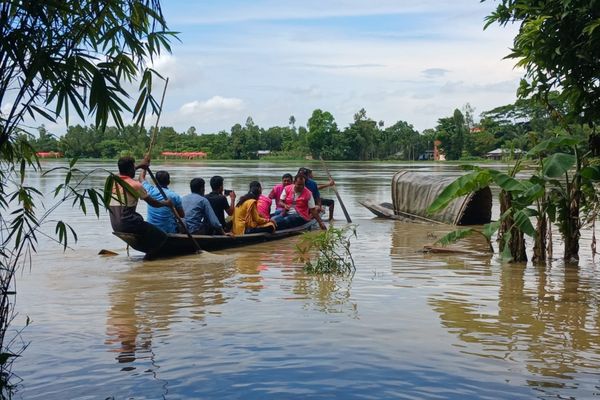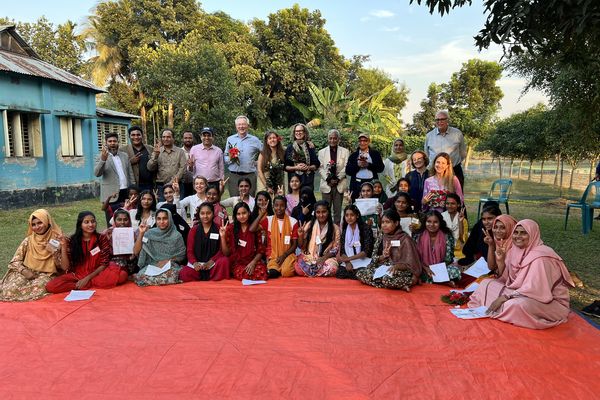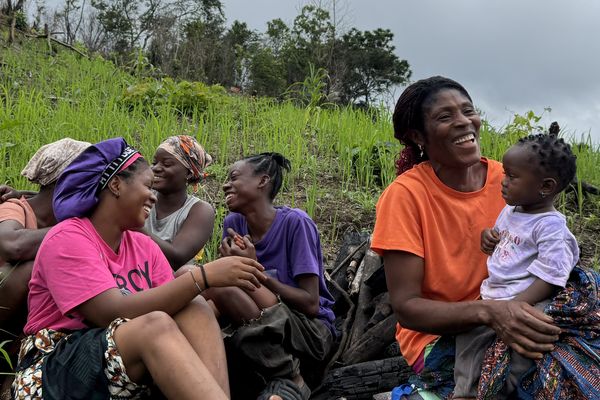BY BRAC USA
At the onset of the flood emergency, teams supported boat rescues and food deliveries. This work has since expanded to meet a wide variety of community needs, with teams stepping in to provide health care services, repair broken tube wells and ruined homes, and help farmers replant crops and restore livelihoods.
Floating clinics
For health teams, delivering aid was hampered by the fact that so many areas remained submerged by water for weeks, making movement a major challenge. Due to these unprecedented conditions, teams established floating medical camps on boats to provide essential medical services to communities that were otherwise inaccessible. Other teams simply resorted to traveling by foot!
Other challenges included finding suitable accommodations for medical teams, as well as responding to a huge demand for medications. In fact, needs for topical ointments and oral medications have far exceeded supply. Teams have worked hard to ensure that there was no duplication of services, which required spontaneous decision-making and strong communication and coordination with other service providers.
In the first phase of BRAC’s health response, teams treated 116,521 patients at 733 medical camps. In those earliest days, BRAC deployed 174 healthcare providers to high-priority areas, ensuring immediate and effective management of skin, waterborne, chronic and non-communicable diseases, along with mental health support.
More recently, from October 7th through 24th, BRAC organized 382 health camps in the communities, reaching 29,761 patients with health services. At the same time, medical officers helped 1,927 patients receive health services at government hospitals.
While floodwaters have receded, the lasting impact continues, as many districts are still grappling with waterlogging and resource shortages. BRAC’s health teams have shifted their focus to sustained, post-flood health care support, working in close collaboration with local health authorities and facilities to ensure that the most vulnerable and affected populations continue to receive the care they need.
Fresh water, dignity, and hope
Through October 30, BRAC’s water, sanitation and hygiene (WASH) teams have made tremendous strides in repairing key services to more than 219,000 people. Tube wells, which provide families — and sometimes whole villages — with safe water, were inundated and often broken during the floods. BRAC teams have disinfected 14,598 wells, repaired another 5,501, and set up 81 new platforms to make it easier for people to access water. Teams have also fixed WASH facilities at 142 institutions, such as schools or medical clinics, and installed 36 latrines for households.
With current funds, BRAC has the following objectives in the coming weeks:
- Restore 160 WASH facilities at educational institutions and shelters
- Construct 800 latrines for families
- Construct 800 tube well platforms
- Distribute 112 hygiene kits at educational institutions
BRAC teams are also working to help families restore their livelihoods. To start, 9,315 families will receive multi-purpose cash support. Meanwhile, 89,800 farmers will receive support for their agricultural work.
Separately, BRAC will provide 900 families with assistance to repair their homes. And 5,000 students will benefit from new learning materials and repairs to 25 schools.
All of this work is thanks to generous donors and visionary partners who have helped power BRAC’s holistic response to the floods. Join them by making a contribution now to ensure flood survivors can access the critical services and support they need to recover and rebuild.
Donate to Bangladesh



